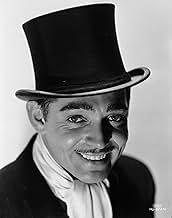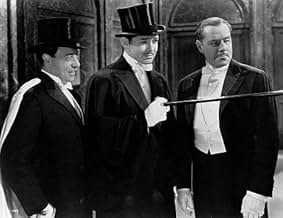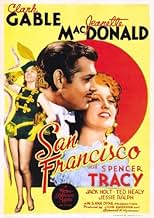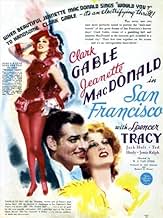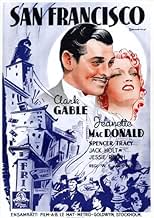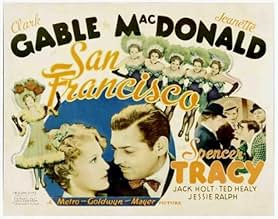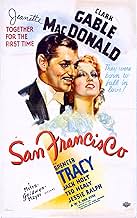IMDb-BEWERTUNG
7,1/10
6453
IHRE BEWERTUNG
Füge eine Handlung in deiner Sprache hinzuA Barbary Coast saloonkeeper and a Nob Hill impresario are rivals for the affections of a beautiful singer, both personally and professionally, in 1906 San Francisco.A Barbary Coast saloonkeeper and a Nob Hill impresario are rivals for the affections of a beautiful singer, both personally and professionally, in 1906 San Francisco.A Barbary Coast saloonkeeper and a Nob Hill impresario are rivals for the affections of a beautiful singer, both personally and professionally, in 1906 San Francisco.
- Regie
- Drehbuch
- Hauptbesetzung
- 1 Oscar gewonnen
- 5 Gewinne & 6 Nominierungen insgesamt
Charles Judels
- Tony
- (as Charles Judells)
Warren Hymer
- Hazeltine
- (as Warren B. Hymer)
Empfohlene Bewertungen
On 31 December 1905, a fire destroys a building at Barbary Coast in San Francisco and on the next day, the singer Mary Blake (Jeanette MacDonald) from Benson, Colorado, that lived in the burnt building looks for a job at the nightclub Paradise. The owner Blackie Norton (Clark Gable) is a ruthless but good man and hires Mary after asking her to show her legs. Blackie is also invited to run to the position of Supervisor of the Coast by his friends and acquaintances to protect the neighborhood.
When Blackie's competitor from Nob Hill, Jack Burley (Jack Holt), and his friend Maestro Baldini (William Ricciardi), hear Mary singing, Jack invites her to sing at his fancy Tivoli Opera House. However, Mary has a two-year contract signed with Blackie and is in love with him. But when the other artists from Paradise see her with Blackie and make malicious comments about her, she quits and goes to Tivoli. On her debut at the Tivoli, Blackie goes there with an authority to call off the concert. Blackie has an injunction against Jack Burley since Mary is still under contract with him. However, when he hears Mary singing the opera, he changes his mind and proposes her to get married with him.
Mary returns to the Paradise but when Blackie's friend Father Tim Mullin (Spencer Tracy) sees Mary exposing her legs, he does not allow her to go to the stage. Mary works at Tivoli and is proposed by Jack Burley to marry him. Meanwhile the powerful Jack Burley uses his influence with the Powers that Be to close the Paradise and arrest the performers. During a musical competition between the clubs, Mary Blake learns the truth and decides to help the Paradise with her presentation. However, it is 1906, the year of the major earthquake that struck San Francisco.
"San Francisco" is a wonderful film of love and earthquake in the sin city. I had no idea that this film was so good and this is the first time that I watch "San Francisco". The story is excellent, with charismatic and ambiguous characters, enjoyable songs sang by Jeanette MacDonald and stunning special effects, with a realistic and convincing earthquake. The very last scene is fantastic.
Clark Gable and Jeanette MacDonald show a magnificent chemistry and it is impressive the resemblance of the face of Madonna in the 80's with Jeanette MacDonald. I only regret that I had not seen this film before. My vote is eight.
Title (Brazil): "San Francisco – A Cidade do Pecado" ("San Francisco" – The Sin City")
When Blackie's competitor from Nob Hill, Jack Burley (Jack Holt), and his friend Maestro Baldini (William Ricciardi), hear Mary singing, Jack invites her to sing at his fancy Tivoli Opera House. However, Mary has a two-year contract signed with Blackie and is in love with him. But when the other artists from Paradise see her with Blackie and make malicious comments about her, she quits and goes to Tivoli. On her debut at the Tivoli, Blackie goes there with an authority to call off the concert. Blackie has an injunction against Jack Burley since Mary is still under contract with him. However, when he hears Mary singing the opera, he changes his mind and proposes her to get married with him.
Mary returns to the Paradise but when Blackie's friend Father Tim Mullin (Spencer Tracy) sees Mary exposing her legs, he does not allow her to go to the stage. Mary works at Tivoli and is proposed by Jack Burley to marry him. Meanwhile the powerful Jack Burley uses his influence with the Powers that Be to close the Paradise and arrest the performers. During a musical competition between the clubs, Mary Blake learns the truth and decides to help the Paradise with her presentation. However, it is 1906, the year of the major earthquake that struck San Francisco.
"San Francisco" is a wonderful film of love and earthquake in the sin city. I had no idea that this film was so good and this is the first time that I watch "San Francisco". The story is excellent, with charismatic and ambiguous characters, enjoyable songs sang by Jeanette MacDonald and stunning special effects, with a realistic and convincing earthquake. The very last scene is fantastic.
Clark Gable and Jeanette MacDonald show a magnificent chemistry and it is impressive the resemblance of the face of Madonna in the 80's with Jeanette MacDonald. I only regret that I had not seen this film before. My vote is eight.
Title (Brazil): "San Francisco – A Cidade do Pecado" ("San Francisco" – The Sin City")
San Francisco, like so many other films from this era, just reminds me again how movies today have lost the art of the build-up. They just hit you over the head with mind-numbing action from frame one. Hollywood(and audiences of today) would do well to watch classics like "San Francisco", where story takes precedence over special effects and when the effects do come, they are in service to the story. And they mean so much more and have so much more impact when held back until the last possible moment. Why can't we allow ourselves to be immersed in the story? Or are we just too impatient for it now?
I have just watched the colorized version of this knock-out film. Whether in color or B &W, it is a powerfully entertaining film. When Blackie Norton finds religion and Mary Blake spots him, humbled and on his redemption encrusted knees,tears well up in my jaded eyes. Everything works so wonderfully in this film. Still, as destructive and tragic as the earthquake scenes are,this movie is basically a love story and what male would not swoon over the voice and the innocence of Mary Blake. Certainly not me.
As in the '70s, disaster films were all the rage in the '30s, with "Hurricane," "The Rains Came," "In Old Chicago," and, of course, 1936's "San Francisco" which certainly sent the other studios running to destroy anything they could. The film stars Clark Gable, Jeannette MacDonald, and Spencer Tracy as three citizens of that beautiful city on April 18, 1906, when the big earthquake struck.
Gable plays Blackie Norton, a quintessential role for him - a tough, charming rogue who runs The Paradise Club. MacDonald is the lovely and talented Mary Black who arrives there looking for work, and Spencer Tracy is Father Tim, who is Blackie's conscience (so he ignores him) and Mary's moral compass. Mary is torn between two loves - her love for Blackie and her love for opera. Burley (Jack Holt) wants her contract from Blackie so he can star her at the Tivoli Opera, but in all things, she suppresses her own desires so that she can stay with Blackie. She finally does leave but returns...only to leave again after an ugly confrontation between Blackie and Father Tim. Things get a lot uglier at an annual contest - and that's when the chandelier starts moving back and forth.
It's amazing what the films in the pre-computer age were able to do with special effects because the earthquake in "San Francisco" is dazzling, spectacular, and downright scary. Given the horrors of 9/11 and Katrina, one is drawn into the devastation and suffering as people search for loved ones, watch their houses fall, go crazy, and see their beloved city dynamited because there's no water to stop the raging fires. 70 years later, it's all way too close to home.
As good as he always was with Gable, Spencer Tracy did not have much of a role as the good father, but he's excellent. MacDonald poses a problem. Normally, she plays a diva or spitfire, and she did those roles beautifully. But Mary Blake is a modest and religious woman who speaks softly and sublimates her own desires for the man she loves. It doesn't ring true, and it doesn't work opposite the volatile Blackie of Gable's. If Mary had been more like other roles she played, MacDonald probably would have had good chemistry with him. As it is, they don't make much of a couple. Her singing is pretty until she hits the opera stage - with the combination of the tinny sound system in those days and the way women were trained on high notes then, the end result isn't good. She sings "The Jewel Song," which she often did in concert, the finale of "Faust," and "Sempre Libera." MacDonald was a lyric coloratura and suited to the demands of the opera stage in the '30s, but today she sounds dated as standards have changed.
This is a great film to see to appreciate the artistry of the early technicians. The effects in "San Francisco" hold up against anything that came 40 years later. The ending is pure Hollywood hokum, but very stirring. It gave this viewer goosebumps. Don't miss Hollywood at its very best.
Gable plays Blackie Norton, a quintessential role for him - a tough, charming rogue who runs The Paradise Club. MacDonald is the lovely and talented Mary Black who arrives there looking for work, and Spencer Tracy is Father Tim, who is Blackie's conscience (so he ignores him) and Mary's moral compass. Mary is torn between two loves - her love for Blackie and her love for opera. Burley (Jack Holt) wants her contract from Blackie so he can star her at the Tivoli Opera, but in all things, she suppresses her own desires so that she can stay with Blackie. She finally does leave but returns...only to leave again after an ugly confrontation between Blackie and Father Tim. Things get a lot uglier at an annual contest - and that's when the chandelier starts moving back and forth.
It's amazing what the films in the pre-computer age were able to do with special effects because the earthquake in "San Francisco" is dazzling, spectacular, and downright scary. Given the horrors of 9/11 and Katrina, one is drawn into the devastation and suffering as people search for loved ones, watch their houses fall, go crazy, and see their beloved city dynamited because there's no water to stop the raging fires. 70 years later, it's all way too close to home.
As good as he always was with Gable, Spencer Tracy did not have much of a role as the good father, but he's excellent. MacDonald poses a problem. Normally, she plays a diva or spitfire, and she did those roles beautifully. But Mary Blake is a modest and religious woman who speaks softly and sublimates her own desires for the man she loves. It doesn't ring true, and it doesn't work opposite the volatile Blackie of Gable's. If Mary had been more like other roles she played, MacDonald probably would have had good chemistry with him. As it is, they don't make much of a couple. Her singing is pretty until she hits the opera stage - with the combination of the tinny sound system in those days and the way women were trained on high notes then, the end result isn't good. She sings "The Jewel Song," which she often did in concert, the finale of "Faust," and "Sempre Libera." MacDonald was a lyric coloratura and suited to the demands of the opera stage in the '30s, but today she sounds dated as standards have changed.
This is a great film to see to appreciate the artistry of the early technicians. The effects in "San Francisco" hold up against anything that came 40 years later. The ending is pure Hollywood hokum, but very stirring. It gave this viewer goosebumps. Don't miss Hollywood at its very best.
John Hoffman (my father) was responsible for the Great Earthquake scene and a number the other montage sequences in the film. A friend of his, the film preservationist David Shepard, tells me the film had already been shot, but the studio execs weren't happy with it. So, they handed it over to the then head of MGM's Montage Department, John Hoffman, to see if he could salvage it. Hoffman rewrote, directed and edited many of the scenes. The result: five Oscar nominations (including 'Best Picture') and one win ('Best Sound') released in 1936, it preceded the introduction of the Oscar for Special Effects award by a few years.
A few years ago, when the Academy Awards Ceremony featured a review of the greatest disaster films ever made, I was disappointed to note that San Francisco hadn't been included. Still, from reading the reviews posted here, it's great to see how many people still appreciate it today.
A few years ago, when the Academy Awards Ceremony featured a review of the greatest disaster films ever made, I was disappointed to note that San Francisco hadn't been included. Still, from reading the reviews posted here, it's great to see how many people still appreciate it today.
Wusstest du schon
- WissenswertesClark Gable did not want to make this film but he was at the mercy of MGM studio head Louis B. Mayer, who had just paid off one of his numerous paramours.
- PatzerAs Blackie walks away from a building being blown up (actually a process shot), Clark Gable's head becomes momentarily transparent.
- Zitate
Jack Burley: [referring to Mary Blake] Well, there's no law against an opera singer being slender, young and beautiful.
- Crazy CreditsPrologue: "San Francisco--guardian of the Golden Gate--stands today a Queen among seaports--industrious, mature, respectable. But perhaps she dreams of the Queen and city she was--splendid and sensuous, vulgar, and magnificent--that perished suddenly with a cry still heard in the hearts of those who knew her, at exactly 5:15 a.m. April 18, 1906."
- Alternative VersionenAfter initial premiere, the manager of the Paramount Theater in San Francisco added to the downbeat ending a few shots showing the Golden Gate Bridge being built. Seeing the positive public reaction, MGM decided to have the sequence added to all other prints in release.
- VerbindungenEdited into What Price Safety! (1938)
- SoundtracksSan Francisco
(1936)
Music by Bronislau Kaper and Walter Jurmann
Lyrics by Gus Kahn
Played during the opening credits and often in the score
Sung by Jeanette MacDonald (uncredited)
Reprised by her and others at a political rally and at the end
Top-Auswahl
Melde dich zum Bewerten an und greife auf die Watchlist für personalisierte Empfehlungen zu.
- How long is San Francisco?Powered by Alexa
Details
Box Office
- Budget
- 1.300.000 $ (geschätzt)
- Laufzeit
- 1 Std. 55 Min.(115 min)
- Farbe
- Seitenverhältnis
- 1.37 : 1
Zu dieser Seite beitragen
Bearbeitung vorschlagen oder fehlenden Inhalt hinzufügen


